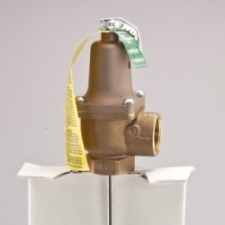
 The U.S. Consumer Product Safety Commission, in cooperation with Watts Regulator Co., of North Andover, Massachusetts, announced a voluntary recall of about 900 temperature and pressure relief valves (1-inch, 140X-9) as the relief valve can fail to reduce pressure and avert failure or rupture of the water heater tank and associated valves, posing rupture and burn hazard to consumers. No incidents or injuries have been reported, but consumers should stop using the recalled products immediately unless otherwise instructed.
The U.S. Consumer Product Safety Commission, in cooperation with Watts Regulator Co., of North Andover, Massachusetts, announced a voluntary recall of about 900 temperature and pressure relief valves (1-inch, 140X-9) as the relief valve can fail to reduce pressure and avert failure or rupture of the water heater tank and associated valves, posing rupture and burn hazard to consumers. No incidents or injuries have been reported, but consumers should stop using the recalled products immediately unless otherwise instructed.
The 1-inch 140X-9 temperature and pressure relief valves are typically used in large water heaters for commercial buildings or possibly for large homes. The valves bear item codes 0259844 (75 psi/210°F); 0259924 (100 psi/210°F); 0259708 (150 psi/210°F); 0259925 (125 psi/210°F); and 0259930 (150 psi/210°F). The affected date codes are 0641R through 0930R. The date code is printed after the model number "M15" on a green metal tag fastened to the pressure relief valve.
They were sold by authorized distributors nationwide from October 2006 through July 2009 for between $250 and $280. The valves commercial locations or possibly large homes.
Consumers should immediately contact Watts Regulator to schedule a free repair. For more information, contact Watts Regulator toll-free at (888) 272-4649 between 8 a.m. and 4:30 p.m. ET Monday through Friday. more>>
 A wave of violent refrigerator explosions in Britain reportedly is believed to have been caused by an attempt to make the machines more "green." The five reported explosions — which destroyed the refrigerators and the kitchens that housed them — appear to coincide with a widespread switch to 'Greenfreeze' technology, the Daily Mail reported.
A wave of violent refrigerator explosions in Britain reportedly is believed to have been caused by an attempt to make the machines more "green." The five reported explosions — which destroyed the refrigerators and the kitchens that housed them — appear to coincide with a widespread switch to 'Greenfreeze' technology, the Daily Mail reported.
The new refrigerators use a different cooling system running on gases that are supposed to be less harmful to the ozone layer, but refrigeration contractor Graeme Fox told the Daily Mail that if the flammable natural gases leak into the fridge, they could trigger a powerful blast. One woman whose fridge exploded three weeks ago told the Mail it caused more than $16,000 worth of damage. Another told the paper she thought an earthquake had struck when she and her sleeping family were rattled awake by her exploding fridge. An independent engineer confirmed that a gas leak is suspected in the most recent fridge explosion, the Daily Mail reported.
Institute of Refrigeration President Jane Gartshore told the Mail that it's theoretically possible that the blasts could be caused by an isobutane leak but added that "there are hundreds of millions of these fridges and these incidents are very, very rare." There are more than 300 million Greenfreeze fridges worldwide, the Mail reported. more>>
 Swimming in a chlorinated pool may boost the odds that a child susceptible to asthma and allergies will develop these problems, a study released today indicates. "These new data clearly show that by irritating the airways of swimmers chlorination products in water and air of swimming pools exert a strong additive effect on the development of asthma and respiratory allergies such as hay fever and allergic rhinitis," Dr. Alfred Bernard, a toxicologist at the Catholic University of Louvain in Brussels, Belgium, noted in an email to Reuters Health.
Swimming in a chlorinated pool may boost the odds that a child susceptible to asthma and allergies will develop these problems, a study released today indicates. "These new data clearly show that by irritating the airways of swimmers chlorination products in water and air of swimming pools exert a strong additive effect on the development of asthma and respiratory allergies such as hay fever and allergic rhinitis," Dr. Alfred Bernard, a toxicologist at the Catholic University of Louvain in Brussels, Belgium, noted in an email to Reuters Health.
"The impact of these chemicals on the respiratory health of children and adolescents appears to be much more important -- at least by a factor of five -- than that associated with secondhand smoke," Bernard noted. Taken together with his team's prior studies, he added, "There is little doubt that pool chlorine is an important factor implicated in the epidemic of allergic diseases affecting the westernized world."
In the current study, Bernard and colleagues compared the health of 733 adolescents, 13 to 18 years old, who swam in chlorinated outdoor and indoor pools for various amounts of time with that of 114 "control" adolescents who swam mostly in pools sanitized with a concentration of copper and silver. In children with allergic sensitivities, swimming in chlorinated pools significantly increased the likelihood of asthma and respiratory allergies, the researchers report in the journal Pediatrics.
Among "sensitive" adolescents, the odds for hay fever were between 3.3- and 6.6-fold higher in those who swam in chlorinated pools for greater than 100 hours and the odds of allergic rhinitis were increased 2.2- to 3.5-fold among those who logged more than 1000 hours of chlorinated pool time. For example, among children and teens who swam in chlorinated pools for 100-500 lifetime hours, 22 children out of 369 (6.0%) had current asthma, compared with those who had spent less than 100 hours (2 of 144, 1.8%). The proportions with asthma rose with longer exposure, to 14 out of 221 (6.4%) who had been swimming for 500-1000 hours, and 17 out of 143 (11.9%) who swam for more than 1000 hours. The risk of asthma and allergy was not influenced by swimming in copper-silver sanitized pools and children without allergic tendencies were not at increased risk of developing allergies.
"The only plausible explanation" for these observations, the researchers argue, is that the chlorine-based toxic chemicals in the water or hovering in the air at the pool surface cause changes in the airway and promote the development of allergic diseases. "It is probably not by chance," Bernard told Reuters Health, "that countries with the highest prevalence of asthma and respiratory allergies are also those where swimming pools are the most popular." The current findings, he and colleagues conclude, "reinforce" the need for further study on the issue and to enforce regulations concerning the levels of these chemicals in water and air of swimming pools. more>>